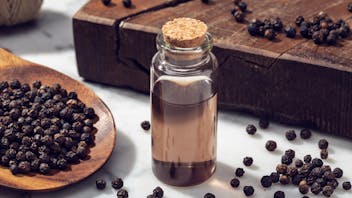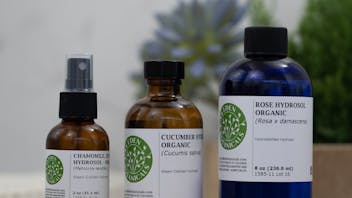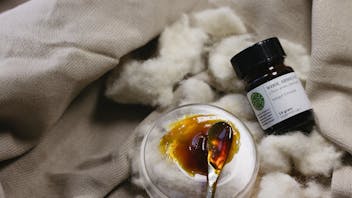Product Overview
Our organic Ginger essential oil has a warm, fresh, somewhat pungent aroma with a sweet, spicy-woody, tenacious undertone. This oil is a superb choice for personal care, cosmetic and skin care applications, where the milder, distilled Ginger essential oils are recommended, rather than the more pungent and very concentrated Ginger CO2 extracts.[1] Approximately 1 kilo of essential oil is obtained from about 150 kilos of dried rhizomes.[2]
Zingiber officinale is native to the tropical coastal locales of India and is cultivated in most tropical and subtropical regions: Jamaica, southwest India, Indochina, Sri Lanka (formerly Ceylon), West Africa, south China, south Japan, and Central America, with smaller crops grown in Madagascar, Zanzibar, Indonesia, northwest Australia, Haiti, Dominican Republic, Cuba, and other areas of the West Indies.[3] The historical usage of Ginger is geographically and culturally vast and it is considered one of the oldest and most important aromatic plants.[4] Ginger was highly esteemed by the ancient Greeks and Romans who obtained it from Arabian traders via the Red Sea.[5]
Despite its long and storied history, the properties of Ginger Root essential oil have only more recently been included as a must-have in the collections of aromatherapists, natural perfumers and massage therapists alike. Many find it useful in massage formulas, both before and after exercise, and in chest and foot rubs. Ginger essential oil benefits mature skin, and its uses include both facial and body care. Inhaling the invigorating aroma of Ginger is an elevating experience for the senses that is enjoyed in many ways across cultures – and particularly while traveling between them. It has been reported by ethnobotanists that women in Senegal and Fouta-Djalon weave the rhizomes of Ginger into belts with the aim of engaging the dormant senses of their husbands.[6] We love it in perfumery or diffuser blends to bring an ambiance of warmth and intimacy.
1 Bowles, E. Joy. The Chemistry of Aromatherapeutic Oils, 3rd ed., 2003, pp. 168-9.
2 Naturals Compendium, International Flavors & Fragrances, Inc., 2009, p. 62.
3 Arctander, Steffen. Perfume and Flavor Materials of Natural Origin, 1960, p. 276.
4 Gildemeister, Eduard and Friedrich Hoffmann. Die Ätherischen Öle [The Volatile Oils], 3rd ed., Vol. I, 1956, p. 119.
5 Guenther, Ernest. The Essential Oils, Vol. V, 1952, pp. 106-7.
6 Valnet, M.D., Jean. The Practice of Aromatherapy, 1990, pp. 135-6.



